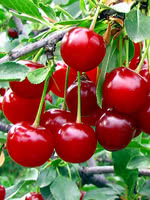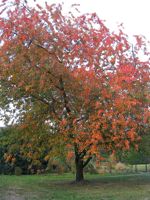Mon-Fri 9am - 5pm Mountain time
Valentine Cherry vs Black Cherry
Prunus x kerrasis Valentine
Prunus serotina
NOT AVAILABLE THIS SEASON - MIGHT RETURN
NOT AVAILABLE THIS SEASON - MIGHT RETURN
Valentine Cherry is a hardy deciduous shrub and hybrid variety of the University of Saskatchewan Sour Cherry released in the Romance Series of dwarf sour cherries in 2004. This medium-sized self-pollinator produces tart, bright red fruits in large clusters in late summer that are perfect for jams, pies and jellies. Valentine Cherry is ideal as a landscape or orchard tree.
Black Cherry is common in eastern North America but a rare find elsewhere. This tree is shade tolerant and is often found in old fields, forest openings, and along fencerows.
The fruit is edible and is commonly used to flavor rum and brandy. It is also edible and often eaten fresh or used in wine or jelly. Black Cherry trees typically begin producing fruit when they are 10 years of age.
Black Cherry wood is a rich reddish-brown color and is strong, making it valued in cabinetry and woodworking. It is often used in reclamation as well.
The leaves can poison livestock as they contain cyanide derivatives and precursors. However, many have noted that deer still seem to browse their trees with impunity and birds and other animals eat the fruit when available.
Valentine Cherry Quick Facts
Black Cherry Quick Facts
Toxicity: bark and wilted leaves toxic to livestock

